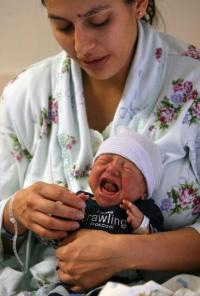El Paso Not Jumping on Baby Boomlet Bandwagon
 Stephanie Sanchez - El Paso Times Stephanie Sanchez - El Paso Times
go to original


| | Yvonne Saucedo held her newborn son, Caleeh Isaias Saucedo, Wednesday at Thomason Hospital. While births have increased steadily in other parts of the United States, they have held relatively stable in El Paso. (Mark Lambie/El Paso Times) | | |
An increase in U.S. births indicates the country is having a baby boomlet, but that hasn't been the case in El Paso, where yearly births have increased only slightly in the past decade.

Nationally, births climbed to 4.3 million in 2006 - the largest recorded number of babies born in 45 years, according to an Associated Press review. But in El Paso County, the number of births actually dipped to 17,840 in 2006 from 18,163 in 2005.

In the past decade, El Paso's number of births has managed to keep up with population growth and nothing more, officials say, rising from 16,503 in 1997 to 17,840 in 2006, according to El Paso County vital statistics.

The yearly number of births in El Paso is expected to climb faster if recent trends continue, officials say. For example, 508 births have already been recorded in El Paso so far in January, only 12 below the average for the entire month.

"I think (births) are increasing, especially with the growth of El Paso and the troops coming to Fort Bliss," said Delia Briones, El Paso County clerk. "El Paso (population) is booming."

The Fort Bliss expansion project is expected to more than double post personnel to nearly 34,000 by 2011 from 14,000 at this time.

She said she has noticed a strain on employees in her office who are trying to keep up with the demand to input birth information.

Cheryl Howard, a professor of sociology and anthropology at the University of Texas at El Paso, said she would be wary of making too much of the increase in births.

Births, she said, are expected to increase when any community's population increases. Between 2000 and 2006, Census Bureau numbers show, the population of El Paso grew by 56,688, bringing it to 736,310 in 2006.

"I don't know that we should make so much of it," Howard said.

She said immigrants settling along the border also contribute to the population growth.

"We know immigrants are generally young, and they generally bring their future children," she said.

Nationally, Hispanics as a group have higher fertility rates - about 40 percent higher than the U.S. overall.

The fertility rate - the average number of children born to women - often rises among immigrants who leave their homelands for a better life. For example, the fertility rate among Mexican-born women in the U.S. is 3.2, but the overall rate in Mexico is 2.4, according to the Pew Hispanic Center, a Washington-based research organization.

"They're more optimistic about their future here," said Jeff Passel, a Pew Hispanic Center demographer.

Dennis Bixler Marquez, director of UTEP's Chicano Studies Program, said he wasn't surprised about the number births in El Paso.

El Pasoans, he said, should start thinking about what city officials are going to do to keep up with the increase, in terms of education, social and medical services.

The increase, he said, "was to be expected."

Sonya Molina, 36, who has a 7-week-old son, Alexander, said the increase in births was not a shock to her, either.

"Nowadays it seems like there are just so many babies being born," she said, adding that her family had a mini-boom. "Three of us were all pregnant. We were all pretty much just weeks apart."

The pregnancies, she said, were not planned by the three sisters-in-law.

"It just happened like that," Molina said, adding that this is her second child. "I felt it had been enough time between my first son and now."

Stephanie Sanchez may be reached at ssanchez(at)elpasotimes.com; 546-6137.

The Associated Press contributed to this story. |



